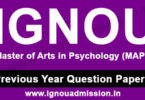IGNOU MA Psychology Courses
Dear reader, In this article, we are going to give you complete detail about IGNOU MA Psychology Courses & IGNOU MA Psychology syllabus 2023.
The programme code is “MAPC”
The Indira Gandhi National Open University offers admission to MA Psychology (MAPC) programme in both January and July academic sessions.
Related Post:
It is a two year master degree programme. It includes the courses worth 64 credits where 1 credit is equivalent to 30 study hours which consist of all the learning activities.
Here are the list of the IGNOU MA Psychology Courses in the tabular year:
IGNOU MA Psychology First Year Courses |
||
| Course Code | Course Name | Credits |
| MPC-001 | Cognitive Psychology, Learning and Memory | 4 |
| MPC-002 | Life Span Psychology | 4 |
| MPC-003 | Personality: Theories and Assessment | 4 |
| MPC-004 | Advanced Social Psychology | 4 |
| MPC-005 | Research Methods in Psychology | 4 |
| MPC-006 | Statistics in Psychology | 4 |
| MPCL-007 | Practicals: Experimental Psychology and Psychological Testing | 8 |
IGNOU MA Psychology Second Year Courses (Choose any one group) |
||
| Group A (Clinical Psychology) | ||
| Course Code | Course Name | Credits |
| MPCE 011 | Psychopathology | 4 |
| MPCE 012 | Psychodiagnostics | 4 |
| MPCE 013 | Psychotherapeutic methods | 4 |
| MPCE 014 | Practicum in Clinical Psychology | 6 |
| MPCE 015 | Internship | 8 |
| MPCE 016 /46 | Project / Applied Positive Psychology** | 6 |
| Group B (Counselling Psychology) | ||
| MPCE 021 | Counseling Psychology | 4 |
| MPCE 022 | Assessment in Counselling and Guidance | 4 |
| MPCE 023 | Interventions in counseling | 4 |
| MPCE 024 | Practicum in Counselling Psychology | 6 |
| MPCE 025 | Internship | 8 |
| MPCE 026/ 46 | Project / Applied Positive Psychology** | 6 |
| Group C (Industrial and Organizational Psychology) | ||
| MPCE 031 | Organisational Behaviour (OBY) | 4 |
| MPCE 032 | Human Resource Development (HRD) | 4 |
| MPCE 033 | Organisational Development (OD) | 4 |
| MPCE 034 | Practicum: Industrial and Organisational Psychology | 6 |
| MPCE 035 | Internship | 8 |
| MPCE 036/ 46 | Project/ Applied Positive Psychology** | 6 |
**The students have to choose either Project (MPCE 16/26/36) OR Applied Positive Psychology (MPCE 46),Theory course. This is effective from July 2021 admission cycle and onwards.
IGNOU MA Psychology Syllabus
Do you know the syllabus of MA Pscychology (MAPC) programme? If no, then don’t worry. Here, we have provided the IGNOU MAPC syllabus 2023 in detail of both first and second year.
IGNOU MA Psychology First Year Syllabus
MPC-001: Cognitive Psychology, Learning and Memory
Block-1: Information Processing
- Unit-1 Cognitive Psychology
- Unit-2 Information Processing in Learning and Memory
- Unit-3 Neuropsychological Basis of Learning and Memory
- Unit-4 Models of Information Processing
Block-2: Intelligence and Creativity
- Unit-1 Theories of Intelligence (G and S Factor and the Model of JP Das)
- Unit-2 Multiple Theories of Intelligence (Guilford, Gardner and Sternberg)
- Unit-3 Measurement of Intelligence
- Unit-4 Creativity and Problem Solving
Block-3: Language
- Unit-1 Language Acquisition
- Unit-2 Language Processing (Comprehension and Language Expression)
- Unit-3 Multiligualism and Cognition
- Unit-4 Language and Speech Disorders
Block-4: Problem Solving
- Unit-1 Nature of Problem Solving
- Unit-2 Stages of Problem Solving
- Unit-3 Theoretical Approaches to Problem Solving
- Unit-4 Impediments to Problem Solving
MPC-002: Life Span Psychology
Block-1: Prenatal, Infancy and Early Childhood
- Unit-1 Concept of Develoment, Growth and Development, Life Span Perspective, Methods of Studying Development and Characteristics of Development
- Unit-2 Prenatal Development (Genetics, Enviornment Influence and Hazards of Development)
- Unit-3 Develoment During Infancy (Physical, Psychosocial, Cognitive and Linguistic)
- Unit-4 Early Childhood (Physical, Psychosocial, Cognitive and Linguistic)
Block-2: Development during Early School Years (6-11 Years)
- Unit-1 Physical Development
- Unit-2 Cognitive, Social, Emotional and Moral Development
- Unit-3 Schooling and Development
- Unit-4 Identification of Problems in School Children and Remedial Measures
Block-3: Development during Adolescence
- Unit-1 Physical Changes
- Unit-2 Cognitive Changes
- Unit-3 Identity, Self Concept, Self Esteem, Peer Group Relationship
- Unit-4 Challenges and Issues in Adolescent Development
Block-4: Adulthood and Ageing
- Unit-1 Physical Changes (Early Adulthood, Middle Age, Old Age)
- Unit-2 Cognitive Changes (Early Adulthood, Middle Age, Old Age)
- Unit-3 Psychosocial Changes (Early Adulthood, Middle Age, Old Age)
- Unit-4 Challenges and Issues in Ageing Process
MPC-003 Personality: Theories and Assessment
Block-1: Personality: Theories and Assessment
- Unit-1 Definition and Concept of Personality and Personality Development
- Unit-2 State/Trait Approaches to Personality
- Unit-3 Assessment of Personality
- Unit-4 Key Issues in Personality
Block-2: Theories of Personality-I
- Unit-1 Psychodynamic Theory (Including Horney and Sullivan)
- Unit-2 Social Cognitive Theory of Personality (Bandura)
- Unit-3 Learning Theory of Personality (Pavlov and Skinner)
- Unit-4 Humanistic and Self Theory (Malsow and Rogers)
Block-3: Theories of Personality-II
- Unit-1 Gordon Allport : A Dispositional Theory of Personality
- Unit-2 Raymond Cattell: A Trait Theory of Personality
- Unit-3 Hans Eysenck: A Trait-Type Theory of Personality
- Unit-4 The Big Five Factors: The Basic Dimensions of Personality
Block-4: Assessment of Personality
- Unit-1 Introduction to Assessment and Testing
- Unit-2 Approaches to Personality Assessment (Sefl-Report, Problems of Response in Projective and Behavioural Assessment)
- Unit-3 Behavioural Assessment
- Unit-4 Other Measures of Personality
MPC-004: Advanced Social Psychology
Block-1: Introduction to Social Psychology
- Unit-1 Nature and Concept of Social Psychology and Social Psychology Related to other Disciplines
- Unit-2 Social Cognition: Attribution Theory
- Unit-3 Methods of Social Psychology
- Unit-4 Current Trends in Social Psychology and Ethical Issues
Block-2: Process of Social Influence
- Unit-1 The Concepts of Social Influence
- Unit-2 Pro-social Behaviour and Factors Contributing to Pro-social Behaviour
- Unit-3 Interpersonal Attraction
- Unit-4 Aggression and Violence
Block-3: Attitudes, Stereotypes, Prejudice and Discrimination
- Unit-1 Introduction to Attitude and Stereotypes
- Unit-2 Formation of Attitude and Attitude Change
- Unit-3 Prejudice and Discriminaion
- Unit-4 Social Conflict and Its Resolution
Block-4: Group Dynamics
- Unit-1 Introduction to Group, Formation and Types of Group
- Unit-2 Group Dynamics
- Unit-3 Social Identity, Crowding and Crowd Behaviour
- Unit-4 Cooperation, Competition and Conflicts
MPC-005: Research Methods
Block 1 Introduction to Research Methods in Psychology
- Unit 1 Basic Process/Concept in Research
- Unit 2 Reliability and Validity (External and Internal)
- Unit 3 Variables and Constructs
- Unit 4 Hypothesis Formulation and Sampling
Block 2 Types of Research
- Unit 1 Survey Research
- Unit 2 Ex-post Facto Research
- Unit 3 Experimental Research (including Field Experiment)
- Unit 4 Case Study
Block 3 Research Design
- Unit 1 Experimental Design: Single Factor
- Unit 2 Experimental Design: Factorial Design
- Unit 3 Quasi Experimental Design
- Unit 4 Other Designs (Correlational Design and Comparative Design)
Block 4 Qualitative Research in Psychology
- Unit 1 Introduction Including Ethnography
- Unit 2 Grounded Theory
- Unit 3 Discourse Analysis (Content Narrative)
- Unit 4 Reporting and Evaluating Quality Research
MPC-006: Statistics in Psychology
Block 1 Introduction to Statistics
- Unit 1 Parametric and Nonparametric Statistics
- Unit 2 Descriptive and Inferential Statistics
- Unit 3 Type I and Type II Errors
- Unit 4 Setting Up The Level of Significance
Block 2 Correlation and Regression
- Unit 1 Product Moment Coefficient of Correlation
- Unit 2 Other Types of Correlation (including Phi-coefficient)
- Unit 3 Partial and Multiple Correlation
- Unit 4 Bivariate and Multiple Regression
Block 3 Normal Distribution
- Unit 1 Characteristics of Normal Distribution
- Unit 2 Significance of Mean Differences, Standard Error of the Mean
- Unit 3 Anova (One-Way)
- Unit 4 Two-Way Anova
Block 4 Nonparametric Statistics
- Unit 1 Rationale
- Unit 2 Mann Whitney ‘U’ Test For Two Sample Test
- Unit 3 Kruskal Wallis Analysis of Variance
- Unit 4 Chi Square and Kendall Rank Correlation
MPCL-007 Practicals: Experimental Psychology and Psychological Testing
- Practical 1 Span of Attention
- Practical 2 Memory Experiments
- Practical 3 Intelligence Testing (Bhatia Battery)
- Practical 4 Personality Testing (16 PF)
- Practical 5 Test For Social Behaviour (Vineland Social Maturity Scale)
- Practical 6 Sociometry
- Practical 7 Family Pathology Scale
- Practical 8 Problem Behaviour Checklist (PBCL)
IGNOU MA Psychology Second Year Syllabus
GROUP A: CLINICAL PSYCHOLOGY (OPTIONAL 1)
MPCE 011 Psychopathology
Block 1 Foundations of Psychopathology
- Unit 1 A Brief History of Psychopathology
- Unit 2 Classification of Psychopathology DSM IV TR
- Unit 3 Developmental Pathogenesis
- Unit 4 Childhood Mental Disorder
Block 2 Generalised Anxiety Disorder and Other Mild Mental Disorders
- Unit 1 Anxiety Disorders, Panic Disorder and Phobias
- Unit 2 Generalised Anxiety Disorder and Obsessive Compulsive Disorder
- Unit 3 Post-traumatic Stress Disorder (PTSD)
- Unit 4 Somatoform Disorder and Dissociative Disorder
Block 3 Mood Disorders
- Unit 1 Mild, Moderate and Major Depressive Disorder
- Unit 2 Bipolar Disorder
- Unit 3 Other Mood Disorders: Mood Disorder Due to General Medical Condition
- Unit 4 Substance Induced Mood Disorder
Block 4 Schizophrenia and Other Psychotic Disorders
- Unit 1 Schizophrenia: Etiology, Neurocognitive Functioning and Interpersonal Aspects
- Unit 2 Paranoid and Delusional Disorders
- Unit 3 Psychotic Disorder Due to General Medical Condition
- Unit 4 Substance Induced Psychotic Disorders
Block 5 Personality Disorders
- Unit 1 Borderline Personality Disorder
- Unit 2 Narcissistic Personality Disorder
- Unit 3 Dependent and Histrionic Personality Disorder
- Unit 4 Schizoid and Paranoid Personality Disorder
MPCE 012 Psychodiagnostics
Block 1 Introduction to Psychodiagnostics
- Unit 1 Introduction to Psychodiagnostics, Definition, Concept and Description
- Unit 2 Methods of BehaviouralAssesment
- Unit 3 Assesment in Clinical Psychology
- Unit 4 Ethical Issues in Assessment
Block 2 Psychodiagnostics in Psychology
- Unit 1 Objectives of Psychodiagnostics
- Unit 2 Different Stages in Psychodiagnostics
- Unit 3 Batteries of Test and Assesment Interview
- Unit 4 Report Writing
Block 3 Tests of Cognitive Functions
- Unit 1 Measures of Intelligence and Conceptual Thinking
- Unit 2 The Measurement of Conceptual Thinking (The Binet Simon Intelligence Scale and Wechsler’s Intelligence Scales)
- Unit 3 Measurement of Memory and Creativity
- Unit 4 Utility of Data from the Test of Cognitive Functions
Block 4 Projective Techniques in Psychodiagnostics
- Unit 1 Introduction to Projective Techniques and Neuropsychological Test
- Unit 2 Principles of Measurement and Projective Techniques, Current Status with Special Reference to the Rorschach Test
- Unit 3 The Thematic Apperception Test, Children’s Apperception Test
- Unit 4 Personality Inventories
MPCE 013 Psychotherapeutic Methods
Block 1 Psychological Treatment of Mental Disorders: Major Modalities
- Unit 1 Psychoanalysis, Psychoanalytic/ Psychodynamic Therapy
- Unit 2 Insight Psychotherapy, Interpersonal Psychotherapy
- Unit 3 Short Term Psychotherapies
- Unit 4 Methods of Child Psychotherapy
Block 2 Cognitive and Behaviour Therapies
- Unit 1 Behaviour Modification Techniques
- Unit 2 Cognitive Behaviour Therapies (Including Rational Emotive Therapy)
- Unit 3 Solution Focussed Therapies
- Unit 4. Integrative and Multimodal Therapies
Block 3 Other Therapies for Psychological Interventions
- Unit 1 Roger’s Client Centered Therapy
- Unit 2 Family and Group Psychotherapy
- Unit 3 Psychodynamic Couple Therapy
- Unit 4. Psychotherapy Integration
Block 4 Psychotherapy Across Life Cycle
- Unit 1 Psychotherapy with Children and Adolescents
- Unit 2 Psychotherapy with Adults and Middle Aged Persons
- Unit 3 Psychotherapy with Older Adults
- Unit 4 Psychotherapy in Terminal Illnesses (AIDS, Cancer)
MPCE 014 Practicum in Clinical Psychology
The following practicals are to be conducted by the learners:
1) Sentence Completion Test
2) TAT
3) Rorschach Test
4) Neuropsychological Test (AIIMS Neuropsychological Battery)
5) Interviewing Practice in laboratory (Case Study, Mental Status Examination)
6) Draw a Person Test
7) Beck Depression Inventory
8) State – Trait Anxiety Scale
MPCE 015 Internship
MPCE 016 Project
GROUP B: COUNSELLING PSYCHOLOGY (OPTIONAL 2)
MPCE 021 Counselling Psychology
Block 1 Introduction
- Unit 1 Introduction to Counselling and Characteristics of a Counsellor
- Unit 2 Process of Counselling
- Unit 3 Theoretical Approaches to Counselling
- Unit 4 Ethics in Counselling
Block 2 Counselling: Models and Approaches
- Unit 1 Psychoanalysis, Psychodynamic Psychotherapy
- Unit 2 Behavioural Therapy and Cognitive Behaviour Therapy Approaches to Counselling
- Unit 3 Drama and Art Therapy in Counselling
- Unit 4 Other Therapies (Person Centered Counselling, Solution Focused Counselling)
Block 3 Types of Counselling
- Unit 1 HIV/AIDS Counselling
- Unit 2 Educational and Vocational Counselling
- Unit 3 Child Protection and Child Rights Counselling
- Unit 4. Addiction/Anxiety Counselling
Block 4 Counselling for Mental Disorders
- Unit 1 Depression
- Unit 2 Personality Disorder
- Unit 3 Gender Identity Disorder
- Unit 4 Eating Disorder
MPCE 022 Assessment in Counselling and Guidance
Block 1 Introduction
- Unit 1 Introduction to Assessment: Definition, Description and Differentiating between Testing and Assessment
- Unit 2 Assessment Complexities
- Unit 3 The Ambience and Climate Needed for Assessment and Counseling
- Unit 4 Determination of aspects to be covered in counseling
Block 2 Approaches to Assessment in Counseling
- Unit 1 Interview, Case History, Testing
- Unit 2 Approaches to Counselling: Psychodynamic Approach and Cognitive Approaches
- Unit 3 The Person Centered Approach to Assessment and Counseling
- Unit 4 The Narrative Approach to Assessment and Counseling
Block 3 Assessment in Counselling and Guidance
- Unit 1 The Counselling Setting, and the Role of Counselors in Guidance and Counselling
- Unit 2 Individual and Group Techniques in Counseling and Guidance
- Unit 3 Counselling and Guidance for Career Planning and Decision Making
- Unit 4 Multicultural Counselling and Guidance: Role of Counselors In Preventing Illness and Promoting Positive Health
Block 4 Organising and Planning Counselling and Guidance
- Unit 1 Introduction to Developing Guidance and Counselling Programme
- Unit 2 Rationale and Purpose of Guidance and Counselling Programme
- Unit 3 Organising and Evaluation of Guidance and Counselling Programme
- Unit 4 Methods of Evaluation
MPCE 023 Interventions in Counselling
Block 1 Psychological Intervention: Major Modalities
- Unit 1 Psychoanalysis/Psychodynamic Counselling
- Unit 2 Insight and Short Term Counselling
- Unit 3 Interpersonal Counselling
- Unit 4 Counselling Children
Block 2 Cognitive Behavioural Counselling
- Unit 1 Introduction to Behaviour Modification and Cognitive Approach in Counselling
- Unit 2 Application of Cognitive Therapies in Counselling
- Unit 3 Cognitive Behaviour Modification (Stress Inoculation, Self-instructional, Selfmanagement, Problem Solving)
- Unit 4 Solution Focussed Counselling and Integrative Counselling
Block 3 Other Counselling Interventions
- Unit 1 Roger’s Client Centered Counselling
- Unit 2 Psychodynamic Couple’s Counselling
- Unit 3 Family and Group Counselling
- Unit 4 Eclectic Counselling
Block 4 Counselling: Future Directions
- Unit 1 Teaching and Training for Counselling
- Unit 2 Current Status of Counselling with Special Reference to India
- Unit 3 Future Direction
- Unit 4 Research Findings
MPCE 024 Practicum in Counselling Psychology
The following practicals are to be conducted by the learners:
1) Interviewing Skill Practice
2) Intelligence Testing (WAIS/ Standard Progressive Matrices)
3) Sentence Completion Test
4) Bender Gestalt Test
5) Differential Apitude Test (DAT)
6) Interest Inventory
7) Career Preference Record
8) Adjustment Inventory
MPCE 025 Internship
MPCE 026 Project
GROUP C: INDUSTRIAL AND ORGANISATIONAL PSYCHOLOGY (OPTIONAL 3)
MPCE 031 Organisational Behaviour
Block 1 Organisational Psychology
- Unit 1 Introduction to Organisational Psychology
- Unit 2 Organisational Behaviour, Definition and Importance
- Unit 3 Fundamental Concepts of Organisational Behaviour
- Unit 4 Different Models of OB. (Autocratic, Custodial, Supportive, Collegial, etc.)
Block 2 Personality and Attitudes in OB
- Unit 1 Job Satisfaction
- Unit 2 Work Motivation
- Unit 3 Content Theory, Process Theory and Schedule of Reinforcement
- Unit 4 Organisational Commitment
Block 3 Leadership and Team Building
- Unit 1 Definition of Leadership and Importance of Team Building
- Unit 2 Change Management
- Unit 3 Team Management
- Unit 4 Resolving Conflicts
Block 4 Learning Process and Motivation in Organisational Behaviour
- Unit 1 Principles and Process of Learning
- Unit 2 Behavioural Management
- Unit 3 Motivation in Organisation
- Unit 4 The Process of Motivation for Higher Moral and Productivity
MPCE 032 Human Resource Development
Block 1 Human Resource Planning
- Unit 1 Assessment of Human Resource in Organisation and Human resource Planning
- Unit 2 Human Resource Management
- Unit 3 People Dimension in Human Resource Management and Short Term Human Resource Planning
- Unit 4 Shot-term Programmes in HR and Evaluation
Block 2 Steps in HRM (Human Resource Management)
- Unit 1 Introduction to HRM, Planning and Management
- Unit 2 Training and Development
- Unit 3 Workforce Diversity and Multicultural Factors
- Unit 4 Globalisation and Changing Economy and their Effects on HRM
Block 3 Human Resource Laws
- Unit 1 Intellectual Property Rights
- Unit 2 Labour Laws (Indian and International)
- Unit 3 Laws Related to Workplace Violence and Harassment
- Unit 4 Laws Related to Human Rights Violation
Block 4 Importance of HR Planning
- Unit 1 Goals and Objectives of Human Resource Planning, Corporate Social Responsibility
- Unit 2 Business Strategy and Operational Strategies (Technology and Innovation in HR)
- Unit 3 Retention of Qualified and Technical Personnel (Competency Mapping and Performance Appraisal)
- Unit 4 Planning Investment in Development (Including Corporate Counselling)
MPCE 033 Organisational Development
Block 1 Introduction
- Unit 1 Definition and Introduction to Organisational Development
- Unit 2 Foundations of Organisational Development
- Unit 3 Conceptual Frame Work of OD
- Unit 4 First Order and Second Order Change
Block 2 Assumptions, Beliefs and Values in OD
- Unit 1 Participation and Empowerment
- Unit 2 Teams and Teamwork
- Unit 3 Parallel Learning Structures
- Unit 4 A Normative Re-educative Strategy of Change
Block 3 Analysing and Managing the OD Process
- Unit 1 Components of OD Process
- Unit 2 Diagnosing the System, Sub Units and Processes
- Unit 3 Models for Managing Change (Including Six-box Organisational Model)
- Unit 4 The Programme Evaluation Process in OD (Including Third Wave Consulting)
Block 4 OD Interventions
- Unit 1 Definition, Factors to be Considered, Nature and Classification of OD Interventions.
- Unit 2 Selection and Organising of Intervention Activities
- Unit 3 Typology of Interventions Based on Target Groups.
- Unit 4 Human Process Interventions: Individual, Group and Inter-group, Coaching, Counseling, Training, Behavioural Modeling, Mentoring, Motivating etc.
MPCE 034 Practicum in Organisational Behaviour
The following practicals are to be conducted by the learners:
1) MBTI (Myers Briggs Typology Indicator)
2) Achievement Orientation Test (Dev Mohan Achievement Test)
3) Value System Test (Personal Value Scale)
4) Personality Test (Multidimensional Personality Assessment Test)
5) Sentence Completion Test
6) Conflict Resolution Technique
7) Competition Entrepreneurship Scale
8) Job Stress Scale
MPCE 035 Internship
MPCE 036 Project
If you want to download IGNOU MA Psychology Syllabus pdf, we have provided the direct link below:
Subscribe to us for more latest updates about IGNOU MA Psychology programme.
Frequently Asked Questions
Yes, the MA Psychology from IGNOU is totally valid. After completing Master Degree in Psychology from Indira Gandhi National Open University, students can take admission in any university for higher studies. Also, they are completely eligible to apply for Job in Government / Private sector.
In IGNOU MA Psychology programme, there are six subjects each in both first and second year including theory, practical and project work. For complete details check out this link: IGNOU MA Psychology Subjects
The applicant must possess Bachelor’s Degree or a higher degree from a recognized University.
The total programme fee is Rs.18,000/-. First Year: Rs.9000/- & Second Year: Rs.9000/- Check out complete details here: IGNOU MA Psychology fees



